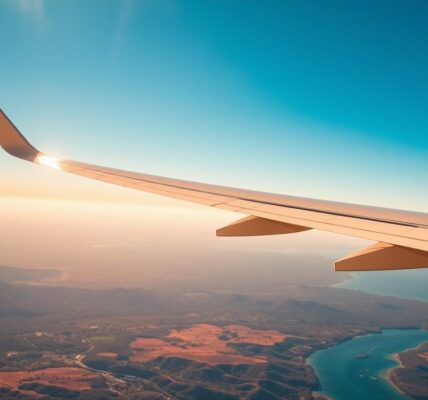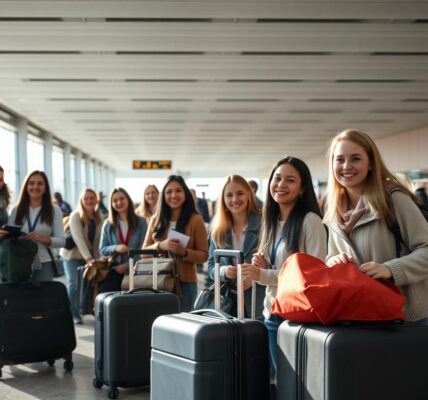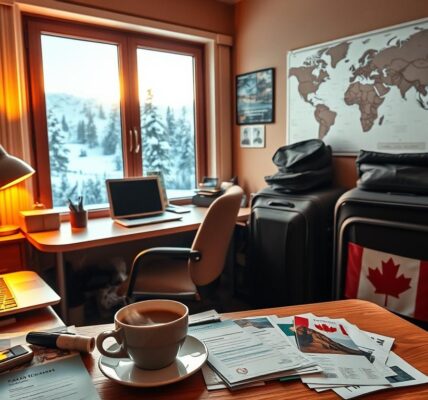What You Need Before Boarding a Flight to Australia: A Practical Guide
Traveling to Australia is an exciting adventure. But, it needs careful planning.
For Nigerian travelers, a detailed Australia flight checklist is key. It helps with entry requirements, health precautions, and packing essentials.
For more information, see the official travel site:
You will be redirected to another website
Understanding Australia’s Entry Requirements
Planning a trip to Australia means knowing the entry rules. There are many visa types for different reasons to visit. It’s key to know what you need to do to travel smoothly.
Visa Types and Application Procedures
There are several visa types for visiting Australia. The main ones are:
- Tourist Visas: For those who want to enjoy the country’s sights.
- Student Visas: For students going to study in Australia.
- Work Visas: For people looking for jobs.
To apply for a visa, you need to fill out an online form. You also have to pay fees and provide documents. A checklist can help you make sure you have everything needed.
Validity and Duration of Stay
Each visa has its own rules for how long you can stay. For example, tourist visas might let you stay up to three months. It’s important to know the rules of your visa to avoid problems.
Special Considerations for Nigerian Travelers
Nigerian travelers might need extra documents for Australian visas. This includes things like a police certificate or proof of ties to Nigeria. Applying early is wise to avoid delays. Knowing these extra steps can make planning easier.
Preparing Travel Documents for the Flight
Getting your travel documents in order is key to a smooth trip to Australia. A detailed checklist helps you prepare well for your flight. You’ll need to gather passport info, supporting documents, and consider digital options.
Essential Passport Information
Your passport must be valid for at least six months after your stay in Australia. This rule helps avoid entry issues. Also, check if your passport needs any special stamps or documents for your visa.
Importance of Supporting Documents
Supporting documents are vital. You’ll need proof of where you’ll stay, like hotel bookings, and proof of your return flight. These help at check-in and with immigration officials. Being ready makes your journey smoother.
Digital Documentation and Copies
Today, digital copies of important documents are a smart move. Keep passport scans and other files in the cloud for easy access. If your documents get lost or stolen, digital backups can save you stress and make your trip better.
Health and Safety Precautions
Traveling to Australia means you need to follow health and safety rules. Knowing about mandatory vaccinations and health certificates is important. It helps you meet entry requirements. Also, getting travel insurance is key to cover health risks during your trip.
It’s vital to follow current health guidelines for a safe trip. This ensures a smooth and enjoyable experience.
Mandatory Vaccinations and Health Certificates
Before you arrive in Australia, you must know about needed vaccinations. Vaccines like those for COVID-19 might be required. You also need health certificates to prove you’ve had the shots.
These documents are crucial for customs checks when you arrive.
Travel Insurance Importance
Getting travel insurance is a must for any traveler. It protects you from unexpected health problems or travel issues. Look for a policy that covers medical emergencies, trip cancellations, and other risks.
Travel insurance is a top international flight essential. It gives you peace of mind while traveling.
Current Health Guidelines for Travelers
The Australian government has detailed health guidelines for travelers. These include tips on hygiene, local health rules, and any travel restrictions. It’s important to stay updated on these guidelines.
Packing Essentials for Australia
When packing for Australia, planning is key. You need to think about the climate, tech needs, and local rules. Knowing what’s banned in Australia helps avoid trouble and makes entry smooth.
Climate Considerations and Clothing
Australia’s weather varies a lot. The north is hot, while the south can get chilly, especially in winter. It’s smart to pack light, breathable clothes for the heat and warm layers for the cold.
Seasons change what you should pack. Here’s a guide for different areas:
| Region | Recommended Clothing |
|---|---|
| Northern Australia | Shorts, t-shirts, sunhat, sandals |
| Central Australia | Lighter layers, sun protection, sturdy shoes |
| Southern Australia | Jackets, sweaters, long pants, shoes |
Electronics and Adapters
Think about what electronics you’ll need. Smartphones, laptops, and tablets are common. Australia’s power outlets are different, so you’ll need the right adapters.
Carrying a universal adapter is a good idea. It makes sure your devices work everywhere, from Nigeria to Australia.
Prohibited Items to Avoid
It’s important to know what can’t be brought into Australia. Some items are banned, and knowing this list helps avoid trouble. Here are some common banned items:
- Fresh fruits and vegetables
- Plant materials and soil
- Bone or ivory items
- Certain types of medication without proper documentation
Knowing what’s banned helps avoid customs delays. It makes your entry into Australia easier.
Airport Check-In Process
Going through the airport check-in can feel overwhelming, especially for international trips. Knowing the right times for check-in and security can make your journey better. It’s also key to stay updated on baggage rules. With the right tips, you can follow security rules and have a smooth trip from start to finish.
Timelines for Check-In and Security
It’s important to get to the airport early. For international flights, aim to check in at least three hours before. For domestic flights, two hours is enough. This gives you time for security checks and any unexpected delays.
Baggage Policies and Limitations
Every airline has its own baggage rules. You need to know about weight limits, size, and banned items. Most airlines let you bring one carry-on and a personal item. But, these rules can change based on your flight and ticket type. Always check these before you pack to avoid surprises.
Online vs. In-Person Check-In
Choosing online check-in can save you time and stress. You can start online 24 to 48 hours before your flight. This lets you pick seats and print passes from home. While in-person check-in offers direct help, it might take longer. Think about what works best for you and your schedule.
Navigating Customs and Quarantine
Travelers need to know the customs rules for Australia flights to have a smooth arrival. The customs process includes declaring items, knowing what you can’t bring in, and getting ready for inspections. Knowing these steps can avoid fines and delays.
Declaration of Items
When you arrive, you must tell customs about certain items. This includes goods like alcohol and tobacco, and gifts or personal items worth over AUD 1,000. Not declaring items correctly can result in big fines and trouble with customs.
Understanding Import Restrictions
Australia has strict rules on what you can bring in, especially food and plants. Don’t bring fresh fruits, veggies, meat, or dairy unless it’s okay. Items that could harm plants or animals might be thrown away. Knowing these rules helps avoid problems.
What to Expect at Customs
At customs, you might have to answer questions and have your bags checked. Always be honest with customs officials. They will scan your bags and check your passport. Being ready can make the process less stressful. Knowing the customs rules for Australia flights helps you get through customs quickly.
| Item Type | Declaration Required? | Importable? |
|---|---|---|
| Alcohol (over 1.5L) | Yes | Yes, within limits |
| Tobacco (over 25 cigarettes) | Yes | Yes, within limits |
| Fresh Fruits | No | No |
| Meat Products | No | No |
| Gifts (over AUD 1,000) | Yes | Yes, under conditions |
Financial Preparation for Your Trip
Getting your finances ready is key for a smooth trip to Australia. A good travel checklist should cover currency exchange, banking, and budgeting. This helps keep your expenses in check.
Currency Exchange Options
There are many ways to exchange currency in Australia. You can use local banks, currency exchange offices, or international money transfer services. Each has different rates and fees.
Another option is to withdraw cash from ATMs. But, make sure to check with your bank about any fees. Knowing your options helps you stay within your budget.
Informing Your Bank of Travel Plans
Telling your bank about your travel plans is important. Many banks can lift foreign transaction alerts for you. This way, you can access your money easily.
If you don’t tell your bank, they might block your transactions. This is to protect against fraud. So, it’s a must on your travel checklist.
Managing Costs in Australia
Managing your money in Australia needs some planning. Use budgeting tools to track your spending. Look for deals on attractions and food.
Be aware of hidden costs like transport or ticket fees. Planning ahead can make your trip financially stress-free.
Transportation Options on Arrival
When you arrive in Australia, knowing your transport options is key. The guide for Australia’s transport offers many choices. You can pick from airport transfers, public transport, or rental cars, depending on what you need.
Airport Transfer Services
Getting to your destination quickly is easy with airport transfer services. Here are some options:
- Taxis: Taxis are right at the airport terminals, taking you straight to your spot.
- Rideshare Apps: Uber and Lyft are popular and can save you money compared to taxis.
- Shuttle Buses: These buses are shared, cheaper, and take you to big hotels and city centers.
Public Transportation Overview
Australia’s cities, like Sydney and Melbourne, have great public transport. Here’s what you need to know:
- Trains: Trains are fast and reliable, connecting suburbs to the city.
- Buses: Buses cover a lot of ground, making them a budget-friendly choice.
- Trams: Only in some cities, trams offer a fun way to see the sights.
Rental Car Considerations
Choosing a rental car gives you freedom to explore. Here are a few things to think about:
- License Requirements: You might need an International Driving Permit (IDP) with your license.
- Insurance Options: Check your insurance to avoid surprise costs on your trip.
- Parking Regulations: Knowing local parking rules helps you avoid fines.
Accommodations and Where to Stay
Finding the right place to stay is key to a great trip. When traveling to Australia, there are many options to choose from. By planning ahead, you can find great deals and enjoy your stay without breaking the bank.
Booking in Advance Recommendations
Booking early is the best way to get the best deals. Early bookings often come with discounts. This helps you save money and avoids last-minute stress.
Types of Lodging Available
Australia has many lodging options to fit every need. Here are a few:
- Hotels: From budget to luxury, hotels offer amenities like room service and pools.
- Hostels: Perfect for those on a tight budget, hostels have dorms or private rooms and a social vibe.
- Airbnb: Renting a home or apartment through Airbnb lets you live like a local.
- Resorts: For relaxation and fun, resorts have lots of activities and facilities for all.
Location Preferences for Travelers
Choosing the right location is crucial for a great trip. Consider:
- Being close to attractions for easy access.
- Having good public transport to explore without a car.
- The vibe of the neighborhood, whether you want city buzz or a quiet beach.
Using these tips can make your trip to Australia even better. Making smart choices is key to a memorable journey.
Staying Connected While in Australia
Travelers going to Australia need to make sure they can stay connected. Before leaving Nigeria, check if your phone works with Australian networks. Most phones work fine, but make sure yours is unlocked and can use GSM networks.
Mobile Phone Compatibility
It’s key to know if your phone works in Australia. Australians use 4G LTE and 5G networks a lot. Make sure your phone can connect to these for better data and faster calls. Old frequencies might limit your options.
SIM Card Options
In Australia, you can buy SIM cards for your phone. Telstra, Optus, and Vodafone have plans for tourists. These plans have lots of data and flexible times. They help you stay connected without spending too much.
Internet Access and Wi-Fi Resources
There’s also internet and Wi-Fi in public places. Cafes, restaurants, and libraries often have free Wi-Fi. This lets you stay online without using your phone’s data. It’s great for finding places, sharing photos, or talking to family back home.
FAQ
What documents do I need to travel to Australia?
To travel to Australia, you need a valid passport and a visa or Electronic Travel Authority (ETA). You also need health documents. Make sure your passport is valid for at least six months after your return date.
Are there specific health requirements for entering Australia?
Yes, you might need certain vaccinations, like for COVID-19. You should also have health insurance. Depending on your vaccination status, you might need health certificates.
What are the baggage restrictions for international flights to Australia?
Baggage rules vary by airline. Usually, you can have one or two checked bags, each weighing 20 to 32 kg. Carry-on luggage also has weight limits.
How can I prepare for customs when arriving in Australia?
When you arrive, you must declare items like food, plants, and animals. Not declaring can lead to fines. It’s important to know what you can and can’t bring into the country.
What should I include in my packing list for Australia?
Pack clothes for the climate, toiletries, electronics, chargers, and any medicines. Don’t forget your passport, visa, and travel insurance details.
How can I manage money while traveling in Australia?
You can exchange currency at banks, ATMs, or exchange services. Tell your bank about your travel plans to avoid card issues. Knowing the local costs helps with budgeting.
What transportation options are available upon arrival in Australia?
You can use airport transfer services like taxis, shuttle buses, or rideshare apps. Public transport, like trains and buses, is also good for city travel.
Is it necessary to book accommodations in advance?
Booking in advance can get you better rates and availability, especially in peak seasons. You can choose from hotels, hostels, or vacation rentals.
How can I stay connected while in Australia?
Check if your phone works with local networks. You might want a local SIM card for data. Public Wi-Fi is also common for internet access.
Are there online check-in options for flights to Australia?
Yes, many airlines let you check in online. This can save time and avoid long airport lines.
Published on: 16 de April de 2025





